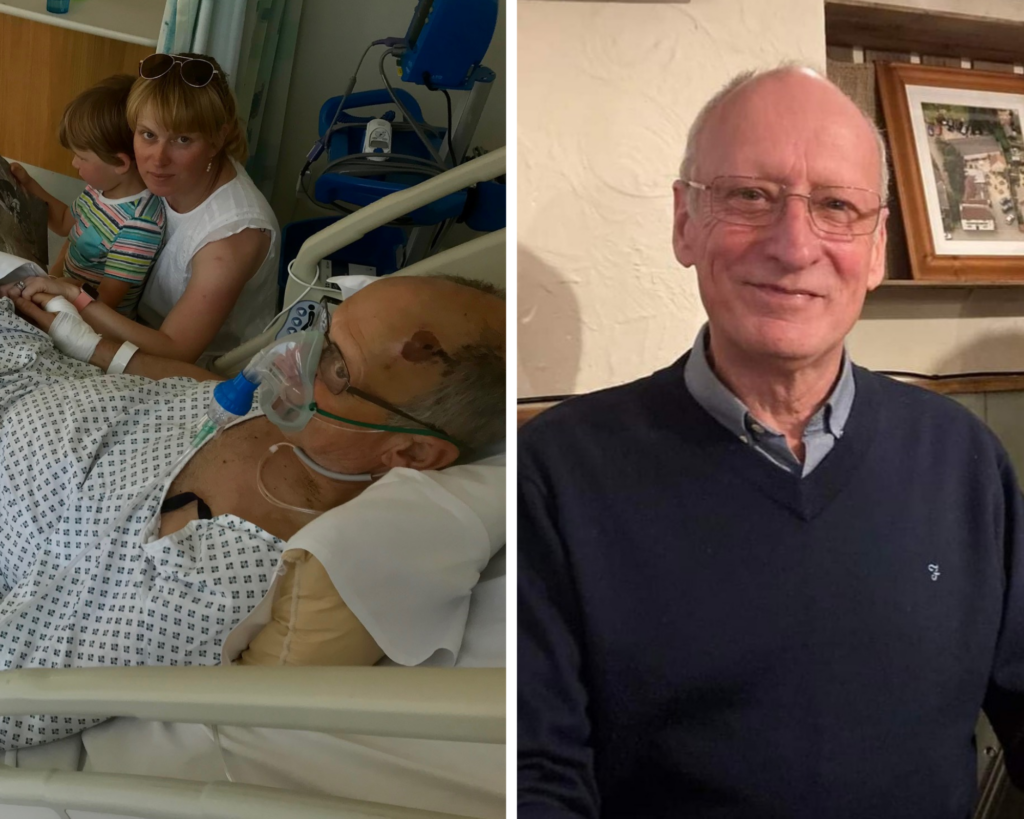News Hub
Former patient highlights importance of air ambulance this Road Safety Week

Road Safety Week (19 -25 November) plays a crucial role in educating communities and advocating for safer road practices.
Road traffic collisions have been one of the most common type of incidents the Derbyshire, Leicestershire & Rutland Air Ambulance (DLRAA) has attended over the years, with the lifesaving service’s critical care crew being tasked to over 450 road traffic collisions this year alone.
Within minutes, DLRAA’s critical care crews can be on the ground delivering pre-hospital emergency care at road traffic collisions, giving patients the very best chance of survival and live their lives to the fullest, patients like Howard.
Experienced motorcyclist Howard Singer says he is “lucky to be alive” after being seriously injured when his motorbike collided with a tractor. The force of the impact caused his helmet to come off and he was launched upwards and 20 feet forward.
“I am very grateful for what the air ambulance crew did for me. I believe it’s the reason I am here today. I feel they saved my life. If it wasn’t for them and the lady who gave me first aid before the helicopter arrived, I don’t think I would be here today,” he says.
Howard is a member of the Institute of Advanced Motorists and has completed advanced motorcycle training provided by Leicestershire police. He has ridden motorbikes as a hobby since he was 17 years old. He was on his own when the accident happened in June 2019 in the Leicestershire village of Gaddesby – about four miles from his home in Twyford.
Howard was behind slow-moving traffic going through the village where there were parked cars at the side of the road due to an event being held at the local school. On leaving the village on a straight road with good visibility he had committed to overtaking the slow-moving traffic when a tractor suddenly turned right, across the front of him.
“I had no time to stop and drove head on into the side of it. The Police described it as ‘a series of coincidences that collided to create an accident’,” he says.
The driver of one of the cars was an Armed Forces trained First Aider, she put Howard into the recovery position and kept him awake until the emergency services arrived.
Howard had sustained multiple injuries which included: facial lacerations/friction burns to both sides of his forehead; cerebral haemorrhage/hematoma; a fractured skull; fractured vertebrae; a dislocated left hip and fractured hip socket; multiple breaks of eight ribs; a collapsed lung; lacerated spleen and bruised aorta – and has no memory of events from a few minutes before the accident until about a week later.
He was still lying in the road when the Derbyshire, Leicestershire & Rutland Air Ambulance critical care crew – the first medical resource at the scene – arrived after landing the helicopter in a nearby field.
He was given pain relief and oxygen to help his breathing and a special binder was applied to his pelvis to help support his injuries and potentially reduce internal blood loss.
It was decided to take Howard to the Major Trauma Centre at Queen’s Medical Centre in Nottingham by land ambulance so that if his chest injury caused him to become more unstable and deteriorate further, he could be anaesthetised – a procedure that cannot be safely conducted in flight in the rear of the helicopter.
The air ambulance critical care team accompanied him in the land ambulance and did a clinical handover to the trauma team at Nottingham on arrival.
Howard’s facial lacerations were stitched, and he was taken to the operating theatre to have his hip relocated. After 10 days in traction, he underwent more surgery to have his hip socket repaired.
Following two and a half weeks in hospital he was allowed home and was finally discharged by doctors after four months.
Since his accident four years ago, Howard has retired to enjoy life with his family and of course motorcycling.
“I went to the Isle of Man last year on a motorbike and went again this year for the Manx motorcycle racing,” says Howard.
Six months after his incident, Howard and his family held an auction in their local pub and raised £4,000 for the DLRAA service to help more people who, like him, are involved in road traffic collisions.
“This service means a lot to me and people in rural communities like ours really understand the importance of the local air ambulance and I am a living example of the difference it can make when it attends an incident.
“I like to support our local superstore in Melton Mowbray and ask friends to do the same. If it wasn’t for DLRAA, I don’t think I would be here today” he adds.

